It should be compulsory for fisherfolk to report and provide proper identification to the authorities prior to heading out to sea, acting Crime Chief Michael Kingston said last week.
Kingston made the recommendation as he testified at a public hearing hosted by the Commission of Inquiry (CoI) into the fatal pirate attacks in which over a dozen fishermen were killed off the coast of Suriname last year. Kingston had overseen the investigation.
He said that to ensure the safety of fisherfolk, there needs to be a more coordinated approach where “all the agencies involved, cooperate and in addition to that, I am of the strong opinion that there should be a reporting mechanism where all fishing vessels have adequate equipment to signal back to shore when they are in distress.”
He emphasised the need for a compulsory system in place to ensure fisherfolk report to a centralised location before heading out to sea. The provision of proper identification for each person heading out to sea to fish should be mandatory so that in case of an emergency, the authorities can have correct information as regards the names and addresses of persons who are fishing in the high seas, he said.
“In absence of that, there will be chaos,” Kingston warned. He pointed out that in the fatal piracy attacks, it took the authorities a number of days to verify who were the persons actually missing.
Kingston recalled that within the first few days, those missing were only identified by “call names,” which, he said, would be a struggle for any investigator.
“But with a proper reporting mechanism in place where persons are required to report to a central authority, central place where they would have to produce documentation before going out to the high sea, then it would be much easier. So when you hear there is a piracy [attack] and X, Y or Z boat involve, you know directly who are the persons on that boat and you have proper names, addresses and so forth, making it easier to contact relatives,” he said.
The policeman recalled that during the months of April to May, he travelled to Suriname with Minister of Public Security Khemraj Ramjattan to “see what assistance we could have given to the Suriname authorities.”
In Suriname, also, “It was strictly call names you were getting people by. You weren’t getting their real names and it took the authorities in Suriname a little while before they got all the names of the persons involved in the piracy issues and as I keep saying, if there is a reporting system where persons are required to present their ID cards, various licences, then I don’t think that problem would exist. The central authority that they are reporting to before proceeding to sea will have some form of logging arrangements where this information would be logged into a book or something so that you know who is at sea,” he said.
Kingston further pointed out that while vessels are licensed in Suriname, most of the owners and fisherfolk are Guyanese and, as such, it is important that Guyana has a record of them as well.
Furthermore, while noting that much information cannot be disclosed pertaining to the direct investigation into the piracy attack since the matter is still before the court, Kingston revealed that three persons have since been charged and it was discovered that persons who were the subjects of the investigation left Guyana via sea and returned after the incident via sea.
The CoI, ordered by President David Granger, is being led by Dr Rishee Thakur.






